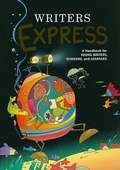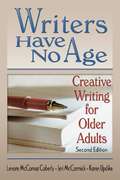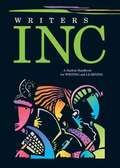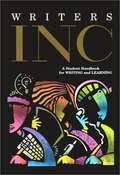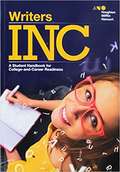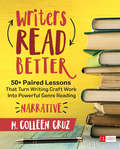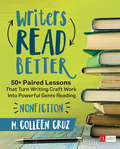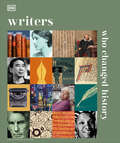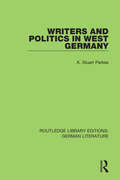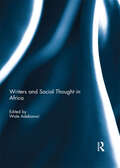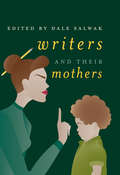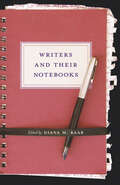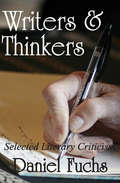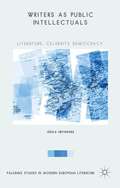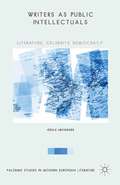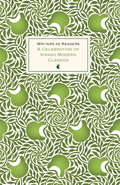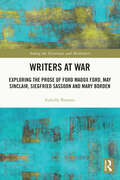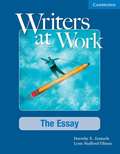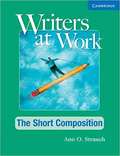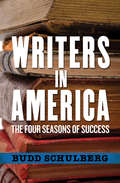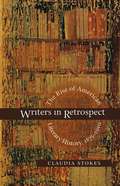- Table View
- List View
Writers Express: A Handbook for Young Writers, Thinkers and Learners
by Dave Kemper Patrick Sebranek Ruth Nathan Chris KrevzkeThis story is not unusual. Kids have been writing and acting out plays for a long time. Writing is a great way to express what you think or fell or imagine. That's why people write, and that's why we've create Writers Express for you. We also hope it help is helps you become a better reader, thinker, speaker, an all-around student. Not bad for one little book!
Writers Have No Age: Creative Writing for Older Adults, Second Edition
by Karen Updike Jeri Mccormick Lenore Mccomas CoberlyWriters Have No Age: Creative Writing for Older Adults, Second Edition is a book for writers by writers. Unlike the first edition, which was aimed at teachers of writing, this edition is aimed at writers themselves. This book will help older writers value themselves and their potential, and increase the pleasure and satisfaction found in writing. It provides both information and inspiration gained from the authors&’ own writing lives and from observation of their students that will help boost writing confidence.Write your way to success-at any age!"We who come to writing do not have to be convinced that there are rewards in store for us. We sense good things ahead and believe in writing&’s benefits." "In this book we have put together some of our own best writing and teaching ideas to help you enjoy the re-creation and stimulation of writing, whatever your age.""Older writers though we are, we do get better at it all the time."-the authors This book combines personal accounts of the authors&’ writing experiences as well as writing instruction and information. It contains numerous writing exercises and assignments to get you started and techniques to keep you at it. It also includes sections that cover all types of writing, including poetry, fiction, and nonfiction. Marketing resources for writers who wish to be published are included.In Writers Have No Age, you will find: authors&’ personal anecdotes-from disappointment to success writing exercises and techniques marketing resources and mediums for writers an editing checklist a list of books and periodicals to help hone writing skills suggestions on teaching or volunteering in nursing homes and much more!Writers Have No Age is a valuable tool for anyone in (or just getting started in) the writing field. Not only will this book help beginners sharpen their writing skills, but it will also help those who have written professionally or personally to reach a wider audience. Add this book to your collection today, and write your way to success!
Writers INC: A Guide to Writing, Thinking, & Learning
by Dave Kemper Patrick Sebranek Verne Meyer Christian R. KrenzkeWriters Inc. is an indispensable handbook and all-purpose reference book for students, professional people, and anyone simply interested in writing and learning. The information is current and "incorporates" the best thinking on writing and writing as it relates to thinking and learning. No handbook can, by itself, make you a better writer. Real improvement only comes from writing regularly. Ask any writer. However, once you make a commitment to writing, no handbook can be more helpful to you than Writers INC.
Writers Inc, A student Handbook for Writing and Learning
by Dave Kemper Patrick Sebranek Verne Meyer Chris KrenzkeNIMAC-sourced textbook
Writers Inc: A Student Handbook for Writing and Learning
by Dave Kemper Patrick Sebranek Verne MeyerYour Writers Inc handbook provides concise, easy-to-use guidelines, samples, and strategies to help you with all of your writing. Writers Inc will also help you with your other learning skills, including study-reading, test taking, note taking, and Internet searches.
Writers Inc: Student Handbook For College-and-Career Readiness
by Houghton Mifflin Harcourt StaffWriters INC Student Handbook is thoughtfully designed with college-and-career readiness in mind, starting with all facets of writing—from constructing sentences and paragraphs to developing academic essays. Explanatory essays and essays of argumentation are included, as are responses to literature and many narrative forms. There are also special sections on writing across the curriculum, social media, updated MLA and APA guidelines, and test taking skills to help students’ master new performance-based assessments.
Writers Read Better: 50+ Paired Lessons That Turn Writing Craft Work Into Powerful Genre Reading (Corwin Literacy)
by M. Colleen CruzWhen It Comes to Reading, Writers Have an Advantage We know that writing skills reinforce reading skills, but what’s the best way to capitalize on this relationship? By flipping the traditional “reading lesson first, writing lesson second” sequence, Colleen Cruz helps you make the most of the writing-to-reading connection with 50 carefully matched lesson pairs centered around narrative texts. Lessons can be implemented either as a complete curriculum or as a supplement to an existing program. Complete with suggestions on adapting the lessons to suit the needs of your classroom and individual students, Writers Reader Better: Narrative offers a solid foundation for giving your students the advantage of transferable literacy skills.
Writers Read Better: 50+ Paired Lessons That Turn Writing Craft Work Into Powerful Genre Reading (Corwin Literacy)
by M. Colleen CruzWhen It Comes to Reading, Writers Have an Advantage We know that writing skills reinforce reading skills, but what’s the best way to capitalize on this relationship? By flipping the traditional “reading lesson first, writing lesson second” sequence, Colleen Cruz helps you make the most of the writing-to-reading connection with 50 carefully matched lesson pairs centered around narrative texts. Lessons can be implemented either as a complete curriculum or as a supplement to an existing program. Complete with suggestions on adapting the lessons to suit the needs of your classroom and individual students, Writers Reader Better: Narrative offers a solid foundation for giving your students the advantage of transferable literacy skills.
Writers Read Better: 50+ Paired Lessons That Turn Writing Craft Work Into Powerful Genre Reading (Corwin Literacy)
by M. Colleen CruzWe know that writing skills reinforce reading skills, but what’s the best way to capitalize on this beneficial relationship? By flipping the traditional "reading lesson first, writing lesson second" sequence, Colleen Cruz ingeniously helps you make the most of the writing-to-reading connection with carefully matched, conceptually connected lesson pairs. The result is a healthy reciprocity that effectively and efficiently develops students’ literacy skills. Backed by long-term academic and field research, Writers Read Better presents a series of 50 tightly interconnected lesson pairs that can be implemented either as supplement existing curriculum or as a stand alone module. Each pairing leads with a writing lesson, used as a springboard for the reading lesson that will follow. Throughout the book’s four sections, organized to cover distinct and complementary phases of working with non-fiction texts, you’ll discover Helpful insights on preparing for the section’s overarching goals Clear guidance on the intention of each lesson, what materials are required, and step-by-step plans for leading the activity Sample teacher language for leading the lesson Tips on building and organizing your classroom library, and how you can incorporate the tools, technology and media available in your classroom to make each lesson most effective Sample student work, online videos and other supporting resources Complete with practical suggestions on adapting the lessons to suit the particular needs of your classroom as well as individual students, Writers Reader Better offers a solid foundation for giving your students the advantage of powerful, transferable literacy skills.
Writers Read Better: 50+ Paired Lessons That Turn Writing Craft Work Into Powerful Genre Reading (Corwin Literacy)
by M. Colleen CruzWe know that writing skills reinforce reading skills, but what’s the best way to capitalize on this beneficial relationship? By flipping the traditional "reading lesson first, writing lesson second" sequence, Colleen Cruz ingeniously helps you make the most of the writing-to-reading connection with carefully matched, conceptually connected lesson pairs. The result is a healthy reciprocity that effectively and efficiently develops students’ literacy skills. Backed by long-term academic and field research, Writers Read Better presents a series of 50 tightly interconnected lesson pairs that can be implemented either as supplement existing curriculum or as a stand alone module. Each pairing leads with a writing lesson, used as a springboard for the reading lesson that will follow. Throughout the book’s four sections, organized to cover distinct and complementary phases of working with non-fiction texts, you’ll discover Helpful insights on preparing for the section’s overarching goals Clear guidance on the intention of each lesson, what materials are required, and step-by-step plans for leading the activity Sample teacher language for leading the lesson Tips on building and organizing your classroom library, and how you can incorporate the tools, technology and media available in your classroom to make each lesson most effective Sample student work, online videos and other supporting resources Complete with practical suggestions on adapting the lessons to suit the particular needs of your classroom as well as individual students, Writers Reader Better offers a solid foundation for giving your students the advantage of powerful, transferable literacy skills.
Writers Who Changed History (DK History Changers)
by DKExplore the fascinating lives and loves of the greatest novelists, poets, and playwrights.Lavishly illustrated with photographs and paintings of writers’ homes, studies, and personal artifacts—along with pages from original manuscripts, first editions, and their correspondence—Writers Who Changed History introduces the key ideas, themes, and literary techniques of each writer, revealing the imaginations and personalities behind some of the world’s greatest novels, short stories, poems, and plays.Introduced with a stunning portrait of each featured novelist, playwright, or poet, biographical entries trace the friendships, loves, and rivalries that inspired each individual and influenced their work, revealing insights into the larger-than-life characters, plots, and evocative settings that they created. Each entry explains how the person’s writing developed during their lifetime and sets it in context, conveying a powerful sense of the place and the period of history in which they lived.Covering an eclectic range of authors from the Middle Ages to the present day, Writers Who Changed History provides a compelling glimpse of the lives and loves of each great writer.
Writers and Politics in West Germany
by K. Stuart ParkesOriginally published in 1986, this book is an interpretative survey of the development of political writing in the former Federal Republic of Germany. It illustrates how intertwined writing is with politics, whether by the political commitment of writers like Grass or the analysis of Böll, by the exclusion of writers from political debate under Adenauer or their insistence on involvement in the years of the SPD. So many themes central to German life are themselves political – the division of the German state, the interpretation of the German character, the Green Movement. This wide-ranging and thorough study discusses a central issue of European politics and culture.
Writers and Social Thought in Africa
by Wale AdebanwiSocial theory and social theorizing about Africa has largely ignored African literature. However, because writers are some of the continent’s finest social thinkers, they have produced – and continue to produce – works which constitute potential sources for the analysis of social thought, and for constructing social theory, in and beyond the continent.This comprehensive collection examines the relationship between African literature and African social thought. It explores the evolution and aesthetics of social thought in African fiction, and African writers’ conceptions of power and authority, legitimacy, history and modernity, gender and sexuality, culture, epistemology, globalization, and change and continuity in Africa.This book was originally published as a special issue of the Journal of Contemporary African Studies.
Writers and Their Mothers
by Dale SalwakIan McEwan, Margaret Drabble, Martin Amis, Rita Dove, Andrew Motion and Anthony Thwaite are among the twenty-two distinguished contributors of original essays to this landmark volume on the profound and frequently perplexing bond between writer and mother. In compelling detail they bring to life the thoughts, work, loves, friendships, passions and, above all, the influence of mothers upon their literary offspring from Shakespeare to the present. Many of the contributors evoke the ideal with fond and loving memories: understanding, selfless, spiritual, tender, protective, reassuring and self-assured mothers who created environments favorable to the development of their children’s gifts. At the opposite end of the parenting spectrum, however, we also see tortured mothers who ignored, interfered with, smothered or abandoned their children. Their early years were times of traumatic loss, unhappily dominated by death and human frailty. Elegantly assembled and presented, Writers and Their Mothers will appeal to everyone interested in biography, literature, and creativity in general.
Writers and Their Notebooks
by Diana M. RaabPersonal reflections on the vital role of the notebook in creative writing, from Dorianne Laux, Sue Grafton, John Dufresne, Kyoko Mori, and more.This collection of essays by established professional writers explores how their notebooks serve as their studios and workshops—places to collect, to play, and to make new discoveries with language, passions, and curiosities. For these diverse writers, the journal also serves as an ideal forum to develop their writing voice, whether crafting fiction, nonfiction, or poetry. Some include sample journal entries that have since developed into published pieces. Through their individual approaches to keeping a notebook, the contributors offer valuable advice, personal recollections, and a hearty endorsement of the value of using notebooks to document, develop, and nurture a writer’s creative spark.
Writers and Thinkers: Selected Literary Criticism
by Daniel FuchsThis is a collection of critical essays that integrate literature and ideas. Daniel Fuchs presents the writer's individuality as artist and thinker, focusing on the writer's interaction within a wide range of cultural, political, and historical periods and situations representative of the modern period. The essays reflect a progression that goes beyond chronology or historical survey in the consistency and interrelation of the literary and cultural themes explored and the references within them.The book is built around writers who are of central concern to the author. It does not pretend to be a comprehensive framework for analysing modernism. Fuchs first deals with high modernism, in discussions of Hemingway and Stevens, who in different ways critique tradition and collapsing values. The essays that follow deal with the "contemporary,"and here the focus is mainly on American Jewish writers and their cultural impact after modernism.The author's stance is in relation not only to these traditions but to others that might be thought antagonistic: the formalism of the New Critics and the deconstructionism that reduces the author to a replaceable variable in the dialects of cultural power relations. Fuchs pays tribute to the former, illustrating wider points in literary, socio-cultural, and political history. The overall emphasis on these "extrinsic" matters underscores the book's appeal to a wide audience.
Writers as Public Intellectuals: Literature, Celebrity, Democracy (Palgrave Studies in Modern European Literature)
by Odile HeyndersThis book demonstrates how authors performing the role of a public intellectual discuss ideas and opinions regarding society while using literary strategies and devices in and beyond the text. Their assumed persona thereby reads the world as a book - interpreting it and offering alternative scenarios for understanding it.
Writers as Public Intellectuals: Literature, Celebrity, Democracy (Palgrave Studies in Modern European Literature)
by Odile HeyndersThis book demonstrates how authors performing the role of a public intellectual discuss ideas and opinions regarding society while using literary strategies and devices in and beyond the text. Their assumed persona thereby reads the world as a book - interpreting it and offering alternative scenarios for understanding it.
Writers as Readers: A Celebration of Virago Modern Classics (VMC Designer Collection)
by Virago PressMargaret Drabble | Beryl Bainbridge | Angela Carter | Maggie O'Farrell | Elizabeth Jane Howard | A. S. Byatt | Penelope Lively | Sarah Waters | Jonathan Coe | Diana Souhami | Jilly Cooper | Elizabeth Bowen | Mark Bostridge | Alexander McCall Smith | Sarah Dunant | Rachel Cooke | Zadie Smith | Anita Desai | Sophie Dahl | Clare Boylan | Paula McLain | Diana Athill | Marina Lewycka | Claire Messud | Michèle Roberts | Simon Russell Beale | Amanda Craig | Hilary Mantel | Elizabeth Taylor | Ali Smith | Linda Grant | Jane Gardam | Julie Burchill | Carmen Callil | Helen Oyeyemi | Marian Keyes | Nora Ephron | Sandi Toksvig | Kate SaundersWriters as Readers is a celebration of forty years of the Virago Modern Classics list. Started in 1978, Virago Modern Classics is dedicated to the rediscovery and championing of women writers, challenging the often narrow definition of 'classic'. In this collection, forty of the most significant writers of the past century tell us about one of their favourite writers by introducing books from the Virago Modern Classics collection, offering a glimpse at the treasures that have been published over the past four decades: they may be great works of literature; they may be wonderful period pieces; they may reveal particular aspects of women's lives; they may be classics of comedy, storytelling, diary-writing or autobiography.
Writers at War: Exploring the Prose of Ford Madox Ford, May Sinclair, Siegfried Sassoon and Mary Borden (Among the Victorians and Modernists)
by Isabelle BrasmeWriters at War addresses the most immediate representations of the First World War in the prose of Ford Madox Ford, May Sinclair, Siegfried Sassoon and Mary Borden; it interrogates the various ways in which these writers contended with conveying their war experience from the temporal and spatial proximity of the warzone and investigates the multifarious impact of the war on the (re)development of their aesthetics. It also interrogates to what extent these texts aligned with or challenged existing social, cultural, philosophical, and aesthetic norms. While this book is concerned with literary technique, the rich scholarship on questions of gender, trauma, and cultural studies on WWI literature serves as a foundation. This book does not oppose these perspectives but offers a complementary approach based on close critical reading. The distinctiveness of this study stems from its focus on the question of representation and form and on the specific role of the war in the four authors’ literary careers. This is the first scholarly work concerned exclusively with theorising writing produced from the immediacy of the war. This book is intended for academics, researchers, PhD candidates, postgraduates and anyone interested in war literature.
Writers at Work: The Essay
by Dorothy E. Zemach Lynn Stafford-YilmazThe Writers at Work series takes beginning to high intermediate-level writing students through a process approach to writing. The series is intended primarily for adults whose first language is not English, but it may also prove effective for younger writers or for native speakers of English who are developing their competence as independent writers in English.
Writers at Work: The Short Composition Student's Book
by Ann O. StrauchThe Writers at Work series prepares ESL students to tackle academic essay writing. Writers at Work: The Short Composition teaches low-intermediate to intermediate-level students how to compose multi-paragraph short compositions. Students tap into their personal experience to organize their writing, using academic modes of organization such as exemplification and cause and effect. In addition, students learn how to write about works of fiction and nonfiction by summarizing and citing sources.
Writers in America: The Four Seasons of Success
by Budd SchulbergStories of twentieth-century American literary giants, by the man who was their friend, peer, and confidant When he was introduced to F. Scott Fitzgerald as a potential partner on a screenplay, novelist and scriptwriter Budd Schulberg was surprised the author was still alive. In Schulberg&’s view, the pressures of success and the public&’s merciless judgment had destroyed Fitzgerald&’s talent early in his career—a situation that is arguably typical for many of America&’s great literary geniuses. In Writers in America, Schulberg shares memories and insights from his relationships with authors such as Fitzgerald, John Steinbeck, Nathaneal West, and Sinclair Lewis, as well as brilliant writers who never attained the success and recognition they deserved, such as Thomas Heggen. This ebook features an illustrated biography of Budd Schulberg including rare images and never-before-seen documents from the author&’s estate.
Writers in Politics (Studies in African Literature)
by Ngugi Wa Thiong'OA collection of essays by Ngugi wa Thiong'o.
Writers in Retrospect
by Claudia StokesIn the aftermath of America's centennial celebrations of 1876, readers developed an appetite for chronicles of the nation's past. Born amid this national vogue, the field of American literary history was touted as the balm for numerous "ills--from burgeoning immigration to American anti-intellectualism to demanding university administrators--and enjoyed immense popularity between 1880 and 1910. In the first major analysis of the field's early decades, Claudia Stokes offers important insights into the practices, beliefs, and values that shaped the emerging discipline and have continued to shape it for the last century. She considers particular personalities--including Thomas Wentworth Higginson, William Dean Howells, Brander Matthews, and Mark Twain--and episodes that had a formative effect on American literary history as a discipline. Reexamining the field's deep attachment to the literature of antebellum New England, the periodization of the nineteenth century, and the omission of Native narratives, Stokes reveals the many forces, both inside and outside the academy, that propelled the rise of American literary history and persist as influences on the work of current practitioners of the field.
